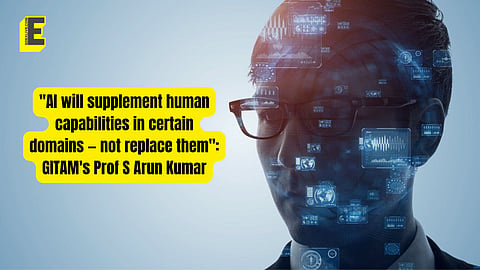"AI will supplement human capabilities in certain domains — not replace them": GITAM's Prof S Arun Kumar
AI and ML are the buzzwords and every upcoming engineer wants to take up these courses academically. Tell us what makes the field so attractive and what kind of hard and soft skills should students identify in themselves before deciding to enroll for the course?
Artificial Intelligence (AI) and Machine Learning (ML) have gained widespread recognition, attracting considerable interest on a global scale. The field is rapidly evolving providing numerous opportunities to skilled professionals in various industries.
A strong foundation in Linear Algebra, Numerical Methods and Statistics is necessary for the study of AI and ML. In view of the fast-changing technology landscape in this area, critical thinking and adaptability are highly desirable for an individual to achieve success throughout their career.
AI is being used more and more in every field, tell us about two fields which are going to be transformed by AI and hence, students should be on the lookout for.
Education and Healthcare are two areas that can greatly benefit from the advent of AI.
AI has the potential to transform education in numerous ways, enhancing teaching methodologies, personalising learning experiences and improving administrative efficiency. Healthcare is another domain that benefits from the power of AI.
AI can provide personalised treatment plans, make medical care accessible to remote locations via medical expert systems and assist in fast and improved diagnostic services.
Machine learning models can help understand patient data to predict disease outbreaks and assess treatment outcomes, enabling proactive healthcare interventions.
Now the question that we all fear — will AI actually replace the human workforce? Which job roles will survive in the presence of AI and what skills should students develop in this direction?
While AI may replace humans in certain job roles, it will make not all professions redundant. AI is a powerful tool designed to supplement human capabilities in certain domains — not replace them. While we are likely to see a shift in the types of skills that are necessary in the workplace, it is inconceivable that AI and ML can replace the human workforce.
Critical thinking, creativity, emotional intelligence, and complex problem-solving are areas in which humans will continue to excel over AI.
Leveraging and adapting to AI assistants, regardless of one’s field of study, will be crucial for most job roles. Equally important are adaptability, lifelong learning and the ability to communicate and collaborate effectively.



